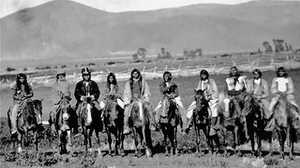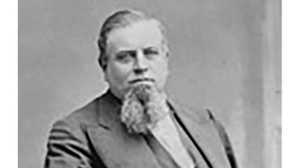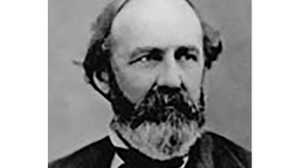Asa Whitney (1791-1874) and Early Plans for a Transcontinental Railroad
Born to a family of of prominent farmers and manufacturers (Eli Whitney, inventor of the cotton gin, was a distant cousin), young Asa Whitney displayed ambition in business. In his teens he went to New York to work his way up the mercantile ladder. By the 1820s purchasing jobs sent him often to Europe, where in 1830 Whitney had the opportunity to ride an early British steam locomotive. By middle age Whitney oversaw a successful import business. But a weakening economy shuttered its doors, and the financial impact cost him his home. When his second wife died during childbirth, Whitney decided to remove himself far away from the scenes of his misfortune. He opted for the other side of the world.
Eye-Opening Voyage
It took Whitney 153 days on a cramped sailing ship to reach China's Canton province. The kind-hearted merchant disliked the captain's treatment of his crew and the social inequality he encountered at colonial holdings along the way. He mused, "Oh how long must the mighty oppress & brutalize the weaker... When I see human beings in such oppressive ignorance & servitude, I cannot help but feel that they were created for a more noble & exalted purpose..." In China, Whitney did a brisk business over a year and a half. By 1844 when he began the voyage home, he'd secured for himself a comfortable fortune and the conviction that from then on, his duty would be to ennoble humankind.
A Corridor of Exchange
In the Pacific Railroad, Whitney found his purpose. Since 1830 pamphleteers had unsuccessfully championed its construction. The merchant now took up the cause. Whitney knew that linking coasts would unlock the commercial potential of China while eliminating infernal ocean commutes. He believed a railway would become the corridor of exchange between Europe and Asia, placing America at the center of the world's attention. Best of all, he saw vast opportunity for human improvement. "[It] would bring all our immensely wide-spread population together as one vast city; the moral and social effects of which must harmonize all together as one family, with but one interest -- the general good of all." An entire continent would open itself to be settled by the throngs of the East. And, he thought, the natives of those vast lands would join the American family.
Self-Financing Scheme
Whitney's optimism was overly idealistic but in accordance with his times. Manifest destiny, the idea that European Americans should and would expand the nation's boundaries, gripped the nation's imagination. The land-grabbing presidency of James K. Polk would soon increase territorial holdings to the Pacific. Groups of emigrants already moved west in search of fortune or homestead. And in 1845 Senator Zadock Pratt introduced the Memorial of Asa Whitney to legislators, calling for construction of a railroad west from Lake Michigan. Whitney foresaw a self-financing enterprise. He asked that government grant him 60-mile strips of land along the length of his route. Sale of this land to settlers would finance construction of the road. As settlement increased so would progress westward. For himself Whitney asked only those lands left unsettled upon completion. Excess profits would maintain the road or finance public education.
Undeterred Optimism
In spite of Whitney's evangelism, Congress tabled the proposal. Undeterred, Whitney unleashed a publicity campaign that would last six years. He became an incredibly popular speaker and a darling of the newspapers. In Washington, however, other matters clouded progress. Territorial expansion led to bitter debates in the legislature over whether those lands would allow slavery. The issue was divided by sectional interests, and culminated in the tenuous Compromise of 1850. As years passed, and the country grew wetward, those settlers Whitney hoped might fund his project instead ate up sections of his route. Alternate schemes were introduced, and opponents such as Thomas Hart Benton discredited Whitney's vision and the authenticity of his intentions. The merchant insisted, "I have but one motive, or object, and that is to see this great work successfully accomplished, which would be a sufficient reward for my labors."
Defeated
It was not to be. In 1851 Whitney's proposals were rejected one last time. Defeated, he faded into private life. He would live to see the completion of the transcontinental railroad accomplished by other men. Those speculators understood what he had not: that government support, business and spoils, not philanthropy, could build the railroad.
Ultimately, Whitney's major contribution was to make the road a popular topic of public debate. He caused it to take hold in the public mind, and there the idea resided even after his defeat. In 1869 he was largely forgotten, but Sacramento's May 8th jubilee, celebrating the railroad's completion, toasted his pioneering vision.







